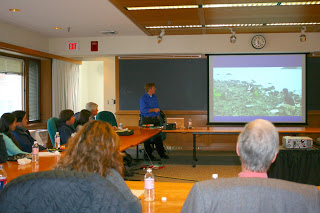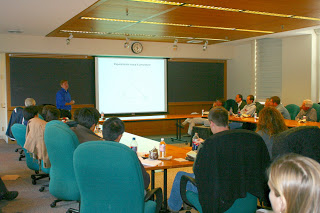- Public Policy
- Leadership
- Funding
- News & Events
- About the Center
Back to Top Nav
Back to Top Nav
Back to Top Nav
Back to Top Nav

The first Social Psychology Research Interest Group (SPRIG) Faculty Workshop of the academic year was held on Tuesday, November 2, 2010. Professor Jay Kralik, from the Dartmouth Psychological and Brain Sciences Department, presented the results of his ongoing research project, "The Evolution of Self-Regulation," to an audience that included scholars from psychological and brain sciences, anthropology, and economics, Dartmouth's professional schools, and many graduate students.
Professor Kralik reported the results of several field experiments on the self-regulatory behavior of rhesus monkeys conducted with the assistance of several Dartmouth undergraduate research assistants. Taken together, the findings indicate that some aspects of self-regulation in people are shared with rhesus monkeys, and thus may have evolved with or prior to our last common ancestor (25-30 million years ago), while other aspects advanced considerably during ape and human evolution, after their evolutionary divergence from monkeys. The abstract for this presentation can be found at the end of this post.
The Social Psychology Research Interest Group (SPRIG) is an interdisciplinary workshop devoted to research on social behavior. It is supported by the Rockefeller Center and includes faculty and graduate students from Psychological and Brain Sciences, Sociology, Economics, the Tuck School of Business, the Dartmouth Medical School, Philosophy, Computer Science, and Government. These workshops are focused on empirical research devoted to understanding social behavior broadly defined. The group has been convened by Jay Hull, Professor of Psychological & Brain Sciences, since 2003 with the assistance of Jane DaSilva of the Rockefeller Center for the Social Sciences.
Past SPRIG presentation titles can be viewed online.

Dr. Jay Kralik - 11/2/10
Presentation Abstract: Evolutionary psychologists believe that social factors strongly influenced the evolution of the human mind, and among social factors the ability for self-regulation is especially important. The study of self-regulation in monkeys can help us understand when and how the capacity for it evolved. In this talk, I will consider three studies of self-regulation in rhesus monkeys. The first shows that the monkeys steeply discount the value of food that is farther away than other food. The monkeys act as though a "bird in the hand" is worth "eight in the bush" instead of two. Such steep discounting can be understood as a consequence of self-regulation in a competitive social environment. The second study shows that the color red is especially important as a cue for self-regulation. The third experiment uncovers a suboptimal decision-making bias in rhesus monkeys in which, under certain conditions, they prefer less food over more. The finding relates to--and may help explain--human decision-making findings like the 'keeping-up-with-the-Joneses phenomenon' in social psychology. Taken together, these findings indicate that some aspects of self-regulation in people are shared with rhesus monkeys, and thus may have evolved with or prior to our last common ancestor (25-30 million years ago), while other aspects advanced considerably during ape and human evolution, after their evolutionary divergence from monkeys.